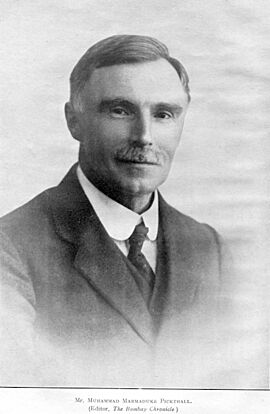Marmaduke Pickthall facts for kids
Quick facts for kids
Muhammad Marmaduke Pickthall
|
|
|---|---|
 |
|
| Born |
Marmaduke William Pickthall
7 April 1875 Cambridge Terrace, London, England
|
| Died | 19 May 1936 (aged 61) Porthminster Hotel, St Ives, Cornwall, England
|
| Resting place | Brookwood Cemetery, Brookwood, Surrey, England |
| Occupation | Novelist, Islamic scholar |
| Known for | The Meaning of the Glorious Koran |
Muhammad Marmaduke Pickthall (born Marmaduke William Pickthall; 7 April 1875 – 19 May 1936) was an English Islamic scholar. He is best known for his 1930 English translation of the Quran, which is the holy book of Islam. This translation, called The Meaning of the Glorious Koran, is still widely used today by English speakers around the world.
Pickthall was born a Christian but later became a Muslim. He was also a talented writer who wrote many novels. Famous authors like D. H. Lawrence and H. G. Wells admired his work. He announced his conversion to Islam on 29 November 1917, during a talk in London.
Contents
About Marmaduke Pickthall
Early Life and Education
Marmaduke William Pickthall was born in London, England, on 7 April 1875. His father, Charles Grayson Pickthall, was an Anglican clergyman, which means he was a priest in the Church of England. Marmaduke spent his early years in the countryside of Suffolk.
When he was six years old, his father passed away. After this, his family moved to London. He went to Harrow School, a famous school in England. Interestingly, one of his classmates and friends at Harrow was Winston Churchill, who later became the Prime Minister of the United Kingdom during World War II.
Travels and Becoming a Muslim
As he grew up, Pickthall traveled a lot, especially to countries in the Middle East. He became known for his deep knowledge of this region. He studied the Orient, which is a term for countries in the East, and wrote many articles and novels about them.
In November 1917, Pickthall publicly declared his faith in Islam. This act is called taking the shahada, which is a statement of belief in Islam. He gave a speech where he talked about how Islam could help the world after World War I.
His Work as a Muslim Scholar
After becoming a Muslim, Pickthall became an active leader in different Islamic groups. He identified himself as a Sunni Muslim. He often gave Friday sermons, known as khutbas, at mosques in London and Woking. Some of his sermons were later published as books.
For a year, he managed the Islamic Information Bureau in London. This bureau published a weekly newspaper called The Muslim Outlook. Pickthall also helped manage two important mosques: the Shah Jahan Mosque, Woking and the East London Mosque.
Translating the Quran
Pickthall's most famous work is his English translation of the Quran. He worked on this project while he was serving the Nizam of Hyderabad, a ruler in India. The translation was called The Meaning of the Glorious Koran.
This translation was approved by Al-Azhar University, a very respected Islamic university in Egypt. The Times Literary Supplement, a well-known literary newspaper, praised his work, calling it "a great literary achievement."
Later Life and Legacy
In 1920, Pickthall moved to India with his wife. He worked as the editor of a newspaper called the Bombay Chronicle. Later, in 1926, he became the Principal of Chadarghat High School in Hyderabad. He returned to England in 1935.
Muhammad Marmaduke Pickthall passed away on 19 May 1936, in Cornwall, England. He was buried in the Muslim section of Brookwood Cemetery in Surrey, England. His translation of the Quran continues to be an important resource for Muslims and non-Muslims who want to understand the holy book in English.
Written Works
Pickthall was a very productive writer. Here are some of the books he wrote:
- All Fools – being the Story of Some Very Young Men and a Girl (1900)
- Saïd the Fisherman (1903)
- Enid (1904)
- Brendle (1905)
- The House of Islam (1906)
- The Myopes (1907)
- Children of the Nile (short story collection) (1908)
- The Valley of the Kings (1909)
- Pot au Feu (1911)
- Larkmeadow (1912)
- The House of War (1913)
- Veiled Women (1913)
- With the Turk in Wartime (1914)
- Tales from Five Chimneys (1915)
- Knights of Araby - the story of Yemen in the 5th Islamic Century (1917)
- Oriental Encounters – Palestine and Syria (1918)
- Sir Limpidus (1919)
- The Early Hours (1921)
- As others See us (1922)
- The Cultural Side of Islam (1927)
- The Meaning of the Glorious Koran: An Explanatory Translation (1930)
As Editor
Pickthall also worked as an editor for other publications:
- Folklore of the Holy Land – Muslim, Christian, and Jewish (1907) (by E H Hanauer)
- Islamic Culture (1927) (Magazine)
Images for kids
See also
- Muhammad Asad
- A. Yusuf Ali
- Ali Ünal
- Rowland Allanson-Winn, 5th Baron Headley
- Henry Stanley, 3rd Baron Stanley of Alderley
- Sir Charles Edward Archibald Watkin Hamilton, 5th Baronet
- William Abdullah Quilliam
- Robert Stanley
- Timothy Winter
- Faris Glubb
- Islam in the United Kingdom
 | Jessica Watkins |
 | Robert Henry Lawrence Jr. |
 | Mae Jemison |
 | Sian Proctor |
 | Guion Bluford |


